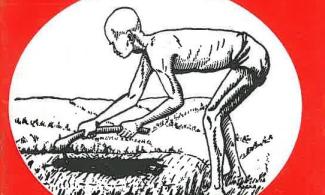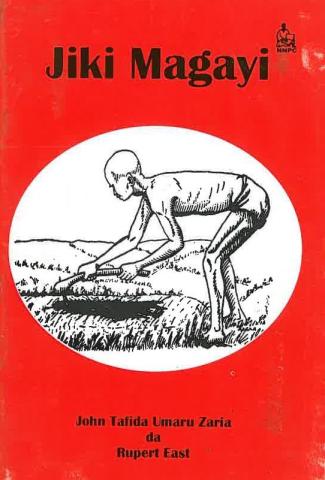
In the literary world, Cyprian Ekwensi is a household name. This holds true particularly for the volume of work he churned out within the corpus of African literature. He was a very good story teller, especially of the urban tale, that many people see him as a better story teller than the Nobel laureate Wole Soyinka or even the more famous novelist, Chinua Achebe. In stark contrast, John Tafida can be considered a nonentity. He is not even popular in the region (Northern Nigeria) where he was born and bred, and where Hausa, the language he wrote in is the unofficial lingua franca. The world knows very little about Tafida, who lived in the obscure Wusasa quarters in Zaria and wrote, perhaps, only one book in a vernacular. All these disadvantages robbed him of a chance to popularity and even a recognition for Pulitzer or Booker Prize, or some other award. In another contrast, the two did not even write in the same medium (language), and there was no clear evidence their paths ever crossed.
Why am I interested in these novelists despite that my background has nothing to do with literature? As a physician, I should be seen writing about diseases and cure, or on great personalities in Medicine. For obvious reasons, I have scant interest in reading novels. My little passion for it died with my teenage. However, from the few I have read, I am left with a puzzle that refused to get solved despite my curiosity and nagging. I learned how to read in Hausa language first before I could read in English. So, it was natural that most of the books I came across early in my life were authored in Hausa. I must confess that very few of those books left a mark on me since the vast m

ajority had a pattern of telling stories on a romance with a happy ending. Scholars of Hausa literature even tagged them as Kano market literature; apparently a pejorative term signifying poor writing quality, juvenile treatment of the subjects and limited creativity. However, there was a generation of creative works before the advent of Kano market literature which was outstanding. I can still remember passages and snippets from Abubakar Imam’s Ruwan Bagaja, Tafawa Balewa’s Shaihu Umar, John Tafida’s Jiki Magayi, Gwarzo Muhammad’s Idon Matambayi, and Bello Kagara’s Gandoki. These five novels were authored decades before I was born and they remain classics. They emerged out of a literary competition organized by the then head of the Translation Bureau in Zaria, Mr. Rupert East, in 1933. Incidentally, Mr. East himself is the co-author of Jiki Magayi. The main drive behind that award was to stimulate the culture of creative writing in Hausa language. The overall winner, Imam, went on to become well established as an author whose other books like Magana Jari Ce, Karamin Sani, and Tafiya Mabudin Ilmi became must read for every pupil passing through formal school in northern Nigeria.
It was not until 1955 when John Tafida’s Jiki Magayi was published. This notwithstanding that it won an award in 1933. By 1962, Cyprian Ekwensi also published his novel titled An African Night Entertainment. These two books, by commission or omission, happened to be an exact replica of each other. They only differed in a way that one was written in Hausa and the other in English. From the first sentence to the last paragraph, Ekwensi appeared to have lifted and translated verbatim the work of John Tafida. I tried to find out whether Tafida’s consent was sought before his work was copy-pasted? I could not get a definitive answer to this query. What is apparent to me is that there is no acknowledgment or reference anywhere to Jiki Magayi as the original idea which Ekwensi stole and appropriated the whole credit for himself. Nothing like that appeared in the preface or foreword of Ekwensi’s plagiarized book.
In the Encyclopedia Britannica entry page, Ekwensi; an Igbo man, was said to have been born on September 26, 1921, in Minna (present capital of Niger state). By implication, he was barely 12 years when Tafida authored Jiki Magayi. This evidence is a pointer that Tafida wrote his book at the time Ekwensi could not have dreamt of becoming a novelist. Ironically, it appears that there is a grand design to lend this issue a fig leaf. This is a clear case of literary fraud that should not be let to go without correcting the wicked wrongdoing.
It is not uncommon in the literary world to see prominent personalities involved in giraffe of other people’s work without proper attribution. Even Martin Luther of saintly projection was found to have plagiarized some sections of his dissertation. His famous speech titled “I Have a Dream’ was also a subject of contention. Yet no single case to my knowledge is as worst as Ekwensi’s, not even Johnny Cash’s case of absorbing Gordon Jenkin’s lyrics in his song titled “Folsom Prison Blues” could parallel the injustice done to Tafida by Ekwensi.
Finally, I crave the indulgence of Association of Nigerian Authors (ANA) and National Copyright Commission to institute a joint probe that would unravel the mystery behind this serious distortion of literary history, or what I choose to call literary fraud of the millennium. We owe it to John Tafida to ensure that justice is done him and his remaining family. If it is discovered that his work was lifted without consent or compensation, every penny derived from that work should be given to his family. The fact that none of them came forward to sue Ekwensi for stealing their work is a signal that they may not be in the right frame of social standing to warrant such. They need this compensation to pay school fees to train more Tafidas. I also expect the federal government of Nigeria to withdraw the national honor awarded to Ekwensi. We have seen in Germany where two ministers (defense and education) were stripped of their Ph.D. honors after it was discovered that they had extensively plagiarized their work.
*Ibrahim Musa is a graduate student in Epidemiology at Texas A&M University. He can be reached on [email protected]